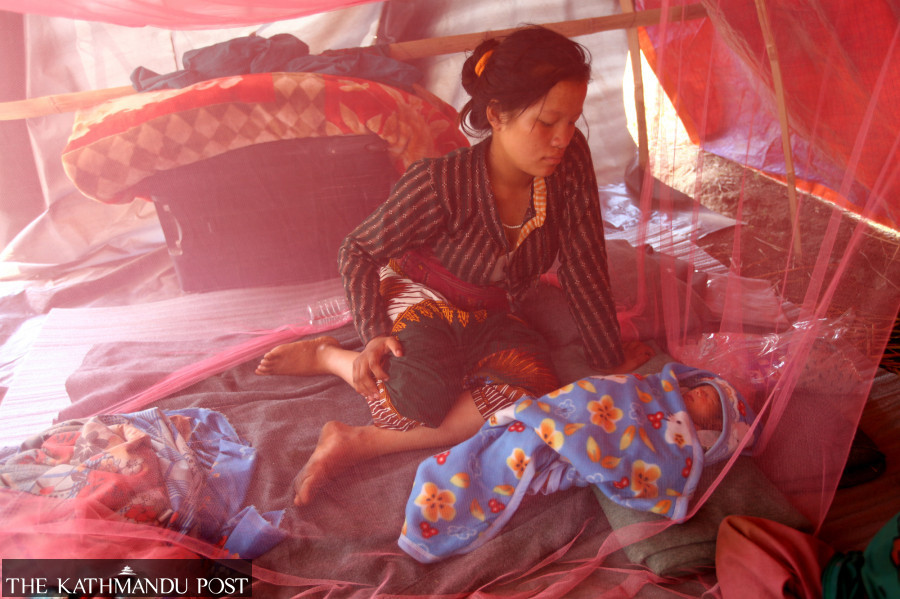Health
Pregnant women are at high risk from Covid-19 but are no priority for vaccine
Of 354 maternal deaths reported after March 2020, at least 44 were due to coronavirus.
Arjun Poudel
At least 354 maternal deaths have been reported since March 24, 2020, the day the country went into its first lockdown to control the spread of the coronavirus.
Of them, at least 44 pregnant women had Covid-19-like symptoms.
“Some of the deceased were confirmed from laboratory tests to have contracted the virus and some had symptoms,” Nisha Joshi, a senior public Health administrator at the Family Welfare Division under the Department of Health Services, told the Post. “The Covid-19 pandemic has taken a toll on pregnant women.”
The first lockdown continued for four months.
Doctors say pregnant and lactating women are highly vulnerable to getting serious and dying from Covid-19. However, despite them being in the highly vulnerable group, the Ministry of Health and Population has not yet listed the women of the said groups as its priority for vaccination.
“We recommended the vaccine for pregnant and lactating women long ago,” Dr Bhola Rijal, chairman of Fertility Society of Nepal, told the Post. “Authorities have even started providing vaccines to people above 18, so they should prioritise the people from highly vulnerable groups like pregnant women and lactating mothers.”
Studies show pregnant women infected with Covid-19 are at more risk of severe illnesses, complications and deaths than ordinary women. Many pregnant women generally have medical conditions, which put them at further risk of getting seriously ill and dying.
“Studies on the impact of coronavirus infections have not been carried out in our country but several studies carried out in Europe, USA and India show that vaccines are safe and the benefit of vaccination outweighs the risks,” said Rijal, who is also a senior gynaecologist.
The US Centers for Disease Control and Prevention on Wednesday recommended Covid-19 vaccination for all people aged 12 years and older including women who are pregnant, breastfeeding, trying to get pregnant now or might become pregnant in the future.
“Evidence about the safety and effectiveness of Covid-19 vaccination during pregnancy has been growing,” reads the CDC’s recommendation. “These data suggest that the benefits of receiving a Covid-19 vaccine outweigh any known or potential risks during pregnancy.”
In Nepal, only 21 percent of the population has been fully vaccinated so far and most of the pregnant women have not taken the jabs, due to confusion persisting among health workers as well as the pregnant women themselves about whether the jabs are safe.
The CDC report stated that there is currently no evidence that any vaccines, including Covid-19 vaccines, cause fertility problems in women or men.
Pregnant and recently pregnant women are more likely to get severely ill with Covid-19 compared to non-pregnant women.
Doctors in Nepal said that severity and deaths from Covid-19 infections among pregnant and lactating mothers could increase as the highly infectious Delta variant of the coronavirus has been spreading throughout the country.
A whole-genome sequencing carried out recently shows that the Delta variant of the SARS-CoV-2 is responsible for the current situation of infections in the country. Though there has not been any genome sequencing on new samples of late, of the 42 swab samples of the infected people, collected between mid-August and September, the Delta variant was detected in 41.
The Health Ministry has already warned people about the presence of the Delta variant in society.
“Pregnant women have weak immunity and other medical conditions as well, which make them more vulnerable to getting serious and dying from coronavirus infections,” Dr Aruna Karki, a consultant gynaecologist, told the Post. “The government should give priority to all pregnant women and lactating mothers in the vaccination drive.”
Nepal Society of Obstetricians and Gynaecologists, an organisation of gynecologists, also recommended priority for pregnant women and lactating mothers in vaccination.
“We not only recommended the vaccine for pregnant women and lactating mothers but also asked for a press release from our society [Nepal Society of Obstetricians and Gynaecologists], urging the authorities concerned to provide vaccines to the said groups that are highly vulnerable.”
The Health Ministry had first prioritised the vaccine for frontline workers including health workers, sanitation workers, hospital staff, security personnel deployed on the front line, people residing in old age homes and prisoners.
Later, vaccines were provided to journalists, people working in diplomatic missions, refugees, bureaucrats, lawmakers, local-level employees and bank employees.
In the second phase of the vaccination, jabs were provided to all people above 65 years of age.
Officials said vaccines were prioritised to the elderly as Covid-related severity and deaths were high among them. Later all essential workers, and those above 54 years were immunised. Currently, vaccines are being provided to all students above 18 and some districts including Kathmandu and Lalitpur have been inoculating everyone above 18.
“Earlier we did not prioritise pregnant women and lactating mothers for vaccination for the lack of clear recommendation by the World Health Organisation,” said Dr Jhalak Gautam, former chief of the National immunisation Programme. “But a recent meeting of the Vaccine Advisory Committee has recommended the government prioritise vaccine for pregnant women and lactating mothers.”
Despite recommendations by various agencies to prioritise pregnant women and lactating mothers for vaccination, they are still not getting the jabs as confusion persists among pregnant women and health workers about the possible side effects.
Experts say that besides according priority to the said age groups, authorities should also raise awareness to clear the confusion and rumors about the side effects.
“We do not have any problems prioritising vaccines for pregnant women,” said Dr Bibek Kumar Lal, director at the Family Welfare Division under the Department of Health Services. “But due to confusion about the side effects, priority was not given to them. We will provide the jabs to them in the coming days.”




 9.83°C Kathmandu
9.83°C Kathmandu















